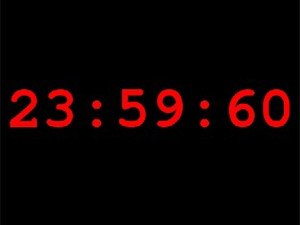
Computer systems around the world have been preparing for an extra "leap" second that will occur either today or tomorrow.
This means at some point during the day, depending where you are in the world, a minute will have 61 seconds.
There have been 25 leap seconds added to years since 1972, and this will be the 26th. The last time it happened was on 30 June 2012 at 23:59:60 UTC, and affected a range of Web sites, including Reddit, Gawker Media, FourSquare, Yelp, StumbleUpon, LinkedIn and Mozilla. Some of the sites crashed, and others would not allow users to logon.
Leap seconds are used to adjust the time scale UTC (Coordinated Universal Time) to the speed of the Earth's rotation as defined by the International Earth Rotation and Reference Systems Service, which is responsible for announcing each year if a leap second needs to occur.
About 10% of large-scale computer networks will encounter hiccups due to the leap second, said Geoff Chester, public affairs officer for the US Naval Observatory. "As systems continue to be more and more connected, it's becoming harder and harder to predict just what the impact could be and how big," said Hiroki Kawai, head of trading systems at the Japan Exchange Group, both speaking in an interview with Bloomberg.
Tech companies have issued statements detailing how they will deal with the extra second to prevent system failure.
Mingxue Zhao, Amazon Web Services senior product manager, said in a blog post, clocks in IT do not always follow the same standard and can behave in different ways.
"For example, some Linux kernels implement a one-second backwards jump instead, so instead of the additional second, the last second is repeated," he explained. "Amazon Web Services plans to spread the extra second over many hours surrounding the leap second by making every second slightly longer."
Google has a similar process. Noah Maxwell and Michael Rothwell, Google site reliability engineers, said in a blog post: "Instead of repeating a second, we 'smear' away the extra second. During a 20-hour 'smear window' centred on the leap second, we slightly slow all our servers' system clocks (by approximately 14 parts per million). At the end of the smear window, the entire leap second has been added, and we are back in sync with civil time."
Maxwell and Rothwell said Google smears the second because: "Any system that depends on careful sequencing of events could experience problems if it sees a repeated second...To avoid changing all time-using software to handle leaps correctly, we instead attempt to make leaps invisible."
Microsoft has said the Windows Time service will ignore the second and sync to the correct time after. "After the leap second occurs... the Windows Time service is one second faster than the actual time. This time difference is resolved at the next time synchronisation."
If the leap seconds did not occur, time would slowly, over millions of years, slip out of sync with the Earth, causing daylight hours to become darker and night hours to become lighter.
Earth's rotation speed varies irregularly in response to climatic and geological events. In 2011, the earthquake in Japan shortened the length of the day by 1.8 microseconds.
John Oliver, host of news satire show, Last Week Tonight, has created a Web site, spendyourleapsecondhere.com. Upon visiting the site, users can click a button to "waste that time with a randomly selected, single-second video".
Share